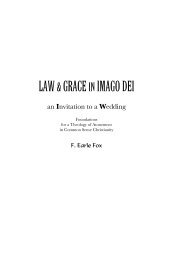Download entire 232-page book HERE (PDF ... - MassResistance
Download entire 232-page book HERE (PDF ... - MassResistance
Download entire 232-page book HERE (PDF ... - MassResistance
You also want an ePaper? Increase the reach of your titles
YUMPU automatically turns print PDFs into web optimized ePapers that Google loves.
Or what man is there among you who, when his son asks for a loaf, will give him a<br />
stone? Or if he asks for a fish, he will not give him a snake, will he? (Matthew 7:9-<br />
10).<br />
While drawing attention to the different kinds of care which mothers and fathers often<br />
provide, God also recognizes the equal status and importance of each parent. In both the Old and<br />
New Testaments, He refers to parents as “father and mother” much more often than He calls them<br />
by the more generic term “parents.”<br />
Human babies are born very helpless compared to other species: it takes a minimum of 3<br />
years for the human child to become mature enough to be at all independent of his parents. Thus<br />
human parents have a long time to train and influence their children. God identifies this helpless state<br />
of human offspring in his use of the term “fatherless,” a general reference to the imperiled state of<br />
children deprived of a parent/protector/provider. Old Testament law specified the means of caring<br />
for such children and made this care a moral duty for the members of a Jewish community. God also<br />
identifies Himself as the ultimate and faithful source of their care: “A father to the fatherless, a<br />
defender of widows, is God in His holy dwelling” (Psalm 68:5).<br />
Many social and survival skills must be learned by a dependent child if he/she is to function<br />
as a member of a human community. The child is taught by parents, but even more importantly,<br />
learns by watching two very different parents interact in complex ways. Some of the most important<br />
skills a child learns from watching mother and father interact (using their different attitudes and<br />
abilities) are:<br />
Task sharing<br />
Reliance on each other<br />
Unselfishness<br />
Resource sharing<br />
Responsibility<br />
Commitment<br />
Self-control<br />
Nurturing<br />
What the Natural Family Teaches<br />
Task sharing<br />
Children have many opportunities to watch their mothers and fathers cooperating on tasks<br />
that require their differing skills and perspectives. One of the most clear-cut examples is infant care.<br />
While many tasks (diapering, dressing, comforting) can be performed equally by either parent,<br />
mothers are indispensable for breast-feeding (!) and often play the main part in teaching language.<br />
Dads are often the teachers of play and risk-taking. Even among the tasks that can be performed by<br />
either parent, a man and woman often “specialize,” choosing some tasks and relinquishing others.<br />
Redeeming the Rainbow 79






